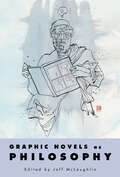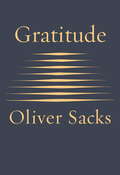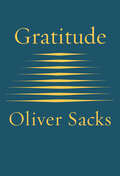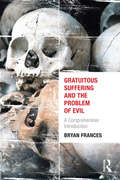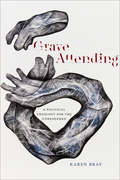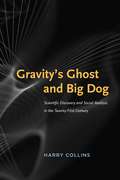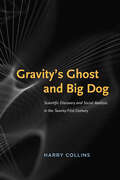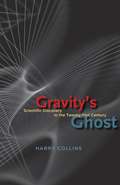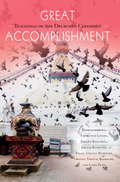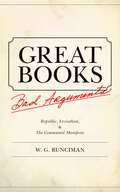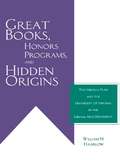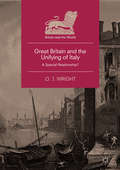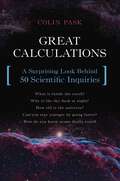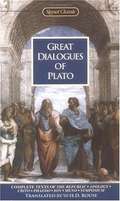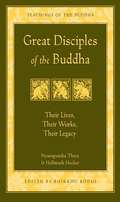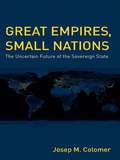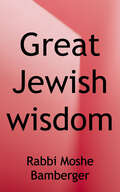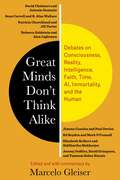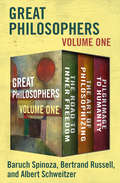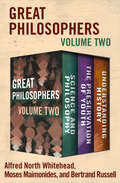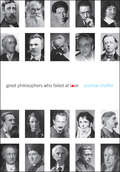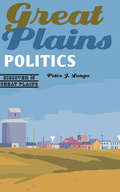- Table View
- List View
Graphic Novels as Philosophy
by Jeff McLaughlinContributions by Eric Bain-Selbo, Jeremy Barris, Maria Botero, Manuel “Mandel” Cabrera Jr., David J. Leichter, Ian MacRae, Jeff McLaughlin, Alfonso Muñoz-Corcuera, Corry Shores, and Jarkko TuusvuoriIn a follow-up to Comics as Philosophy, international contributors address two questions: Which philosophical insights, concepts, and tools can shed light on the graphic novel? And how can the graphic novel cast light on the concerns of philosophy? Each contributor ponders a well-known graphic novel to illuminate ways in which philosophy can untangle particular combinations of image and written word for deeper understanding.Jeff McLaughlin collects a range of essays to examine notable graphic novels within the framework posited by these two questions. One essay discusses how a philosopher discovered that the panels in Jeff Lemire’s Essex County do not just replicate a philosophical argument, but they actually give evidence to an argument that could not have existed otherwise. Another essay reveals how Chris Ware’s manipulation of the medium demonstrates an important sense of time and experience. Still another describes why Maus tends to be more profound than later works that address the Holocaust because of, not in spite of, the fact that the characters are cartoon animals rather than human.Other works contemplated include Will Eisner’s A Contract with God, Alan Moore and David Lloyd’s V for Vendetta, Alison Bechdel’s Fun Home, and Joe Sacco’s Footnotes in Gaza. Mainly, each essay, contributor, graphic novelist, and artist is doing the same thing: trying to tell us how the world is—at least from their point of view.
Gratitude
by Oliver SacksA deeply moving testimony and celebration of how to embrace life.In January 2015, Oliver Sacks was diagnosed with a recurrence of cancer, and he shared this news in a New York Times essay that inspired readers all over the world: "I cannot pretend I am without fear. But my predominant feeling is one of gratitude.... Above all, I have been a sentient being, a thinking animal, on this beautiful planet, and that in itself has been an enormous privilege and adventure."Gratitude consists of four essays that originally appeared in The New York Times, accompanied by a foreword that describes the occasion of each chapter. The foreword is written by Billy Hayes, Oliver Sacks's partner, and Kate Edgar, his long time collaborator.
Gratitude: Essays
by Oliver SacksA deeply moving testimony and celebration of how to embrace life. No writer has succeeded in capturing the medical and human drama of illness as honestly and as eloquently as Oliver Sacks. During the last few months of his life, he wrote a set of essays in which he movingly explored his feelings about completing a life and coming to terms with his own death.&“A series of heart-rending yet ultimately uplifting essays….A lasting gift to readers." —The Washington Post&“It is the fate of every human being,&” Sacks writes, &“to be a unique individual, to find his own path, to live his own life, to die his own death.&” Together, these four essays form an ode to the uniqueness of each human being and to gratitude for the gift of life.&“My predominant feeling is one of gratitude. I have loved and been loved. I have been given much and I have given something in return. Above all, I have been a sentient being, a thinking animal, on this beautiful planet, and that in itself has been an enormous privilege and adventure.&” —Oliver Sacks &“Oliver Sacks was like no other clinician, or writer. He was drawn to the homes of the sick, the institutions of the most frail and disabled, the company of the unusual and the &‘abnormal.&’ He wanted to see humanity in its many variants and to do so in his own, almost anachronistic way—face to face, over time, away from our burgeoning apparatus of computers and algorithms. And, through his writing, he showed us what he saw.&” —Atul Gawande, author of Being Mortal
Gratuitous Suffering and the Problem of Evil: A Comprehensive Introduction
by Bryan FrancesSuffering that is not coupled with any redeeming good is one of our world’s more troubling, apparent glitches. It is particularly vexing for any theist who believes that the world was created by a supremely morally good, knowledgeable, and powerful god. Gratuitous Suffering and the Problem of Evil: A Comprehensive Introduction is among the first book-length discussions of theistic approaches to this issue. Bryan Frances’s lucid and jargon-free analyses of a variety of possible responses to the problem of gratuitous suffering will provide serious students or general readers much material with which to begin an extended contemplation of this ancient and contemporary concern. The perfect size and scope for an introductory philosophy class’s discussion of the problem of evil and suffering, and deliberately crafted to be approachable by all interested readers, Gratuitous Suffering and the Problem of Evil is philosophy doing what it does best: serious, engaged, rigorous explorations of even the darkest truths. The book offers many useful pedagogical features, including chapter overviews and summaries, annotated suggested readings, and eight-eight discussion questions.
Grave Attending: A Political Theology for the Unredeemed
by Karen Bray“This is a book about what it would mean to be a bit moody in the midst of being theological and political. Its framing assumption is that neoliberal economics relies on narratives in which not being in the right mood means a cursed existence.” So begins Grave Attending: A Political Theology for the Unredeemed, which mounts a challenge to neoliberal narratives of redemption. Mapping the contemporary state of political theology, Karen Bray brings it to bear upon secularism, Marxist thought, affect theory, queer temporality, and other critical modes as a way to refuse separating one’s personal mood from the political or philosophical. Introducing the concept of bipolar time, she offers a critique of neoliberal temporality by countering capitalist priorities of efficiency through the experiences of mania and depression. And it is here Bray makes her crucial critical turn, one that values the power of those who are unredeemed in the eyes of liberal democracy—those too slow, too mad, too depressed to be of productive worth—suggesting forms of utopia in the poetics of crip theory and ordinary habit. Through performances of what she calls grave attending—being brought down by the gravity of what is and listening to the ghosts of what might have been—Bray asks readers to choose collective care over individual overcoming.Grave Attending brings critical questions of embodiment, history, and power to the fields of political theology, radical theology, secular theology, and the continental philosophy of religion. Scholars interested in addressing the lack of intersectional engagement within these fields will find this work invaluable. As the forces of neoliberalism demand we be productive, efficient, happy, and flexible in order to be deemed worthy subjects, Grave Attending offers another model for living politically, emotionally, and theologically. Instead of submitting to such a market-driven concept of salvation, this book insists that we remain mad, moody, and unredeemed. Drawing on theories of affect, temporality, disability, queerness, work, and race, Bray persuades us that embodying more just forms of sociality comes not in spite of irredeemable moods, but through them.
Gravitation and Spacetime
by Remo Ruffini Hans C. OhanianThe third edition of this classic textbook is a quantitative introduction for advanced undergraduates and graduate students. It gently guides students from Newton's gravitational theory to special relativity, and then to the relativistic theory of gravitation. General relativity is approached from several perspectives: as a theory constructed by analogy with Maxwell's electrodynamics, as a relativistic generalization of Newton's theory, and as a theory of curved spacetime. The authors provide a concise overview of the important concepts and formulas, coupled with the experimental results underpinning the latest research in the field. Numerous exercises in Newtonian gravitational theory and Maxwell's equations help students master essential concepts for advanced work in general relativity, while detailed spacetime diagrams encourage them to think in terms of four-dimensional geometry. Featuring comprehensive reviews of recent experimental and observational data, the text concludes with chapters on cosmology and the physics of the Big Bang and inflation.
Gravity's Ghost and Big Dog
by Harry Collins"Gravity s Ghost and Big Dog" brings to life science s efforts to detect cosmic gravitational waves. These ripples in space-time are predicted by general relativity, and their discovery will not only demonstrate the truth of Einstein s theories but also transform astronomy. Although no gravitational wave has ever been directly detected, the previous five years have been an especially exciting period in the field. Here sociologist Harry Collins offers readers an unprecedented view of gravitational wave research and explains what it means for an analyst to do work of this kind. Collins was embedded with the gravitational wave physicists as they confronted two possible discoveries BigDog, fully analyzed in this volume for the first time, and the Equinox Event, which was first chronicled by Collins in "Gravity s Ghost. " Collins records the agonizing arguments that arose as the scientists worked out what they had seen and how to present it to the world, along the way demonstrating how even the most statistical of sciences rest on social and philosophical choices. "Gravity s Ghost and Big Dog" draws on nearly fifty years of fieldwork observing scientists at the American Laser Interferometer Gravitational Wave Observatory and elsewhere around the world to offer an inspired commentary on the place of science in society today. "
Gravity's Ghost and Big Dog: Scientific Discovery and Social Analysis in the Twenty-First Century
by Harry Collins“In part an account of sociological fieldwork among scientists in the field and part astronomy-history mystery. . . . a terrific read.” —NatureGravity’s Ghost and Big Dog brings to life science’s efforts to detect cosmic gravitational waves. These ripples in space-time are predicted by general relativity, and their discovery will not only demonstrate the truth of Einstein’s theories but also transform astronomy. Although no gravitational wave has ever been directly detected, the previous five years have been an exciting period in the field. Sociologist Harry Collins offers readers an unprecedented view of the research and explains what it means for an analyst to do work of this kind.Collins was embedded with the gravitational wave physicists as they confronted two possible discoveries—“Big Dog,” fully analyzed in this volume for the first time, and the “Equinox Event,” which was first chronicled by Collins in Gravity’s Ghost. Collins records the agonizing arguments that arose as the scientists worked out what they had seen and how to present it to the world, along the way demonstrating how even the most statistical of sciences rest on social and philosophical choices. Gravity’s Ghost and Big Dog draws on nearly fifty years of fieldwork observing scientists at the American Laser Interferometer Gravitational Wave Observatory and elsewhere around the world to offer an inspired commentary on the place of science in society today.“The physics junkie or philosophy of science enthusiast . . . will find lots to mull over.” —Science News“Makes for very entertaining reading.” —Daniel Kennefick, University of Arkansas, author of Traveling at the Speed of Thought
Gravity's Ghost: Scientific Discovery in the Twenty-first Century
by Harry CollinsIn theory, at least, gravitational waves do exist. We are constantly bathed in gravitational radiation, which is generated when stars explode or collide and a portion of their mass becomes energy that ripples out like a disturbance on the surface of a serene pond. But unfortunately no gravitational wave has ever been directly detected even though the search has lasted more than forty years. As the leading chronicler of the search for gravitational waves, Harry Collins has been right there with the scientists since the start. The result of his unprecedented access to the front lines of physical science is Gravity’s Ghost, a thrilling chronicle of high-stakes research and cutting-edge discovery. Here, Collins reveals that scientific discovery and nondiscovery can turn on scientific traditions and rivalries, that ideal statistical analysis rests on impossible procedures and unattainable knowledge, and that fact in one place is baseless assumption in another. He also argues that sciences like gravitational wave detection, in exemplifying how the intractable is to be handled, can offer scientific leadership a moral beacon for the twenty-first century. In the end, Gravity’s Ghost shows that discoveries are the denouements of dramatic scientific mysteries.
Gravity's Ghost: Scientific Discovery in the Twenty-first Century
by Harry CollinsA gripping look at gravitational wave research and what it says about scientific discovery and the future of the scientific community.&“This fine book pairs exploratory analysis with the pulse of a detective story. Giving a portrait of the way a community chose to test itself on the threshold of new knowledge, Collins offers the rich sociological insight that can only be won from uncommon experience, from a long-standing dialogue with the community he studies, and from a moral engagement in the future of science.&” —Richard Staley, author of Einstein&’s Generation: The Origins of the Relativity Revolution In theory, at least, gravitational waves do exist. We are constantly bathed in gravitational radiation, which is generated when stars explode or collide and a portion of their mass becomes energy that ripples out like a disturbance on the surface of a serene pond. But unfortunately no gravitational wave has ever been directly detected even though the search has lasted more than forty years. As the leading chronicler of the search for gravitational waves, Harry Collins has been right there with the scientists since the start. The result of his unprecedented access to the front lines of physical science is Gravity&’s Ghost, a thrilling chronicle of high-stakes research and cutting-edge discovery. Here, Collins reveals that scientific discovery and nondiscovery can turn on scientific traditions and rivalries, that ideal statistical analysis rests on impossible procedures and unattainable knowledge, and that fact in one place is baseless assumption in another. He also argues that sciences like gravitational wave detection, in exemplifying how the intractable is to be handled, can offer scientific leadership a moral beacon for the twenty-first century. In the end, Gravity&’s Ghost shows that discoveries are the denouements of dramatic scientific mysteries. &“A sociologist embedded (with full access!) in the LIGO Scientific Collaboration chronicles the search for gravitational waves. Though physicists, with very few exceptions, are in no doubt that gravitational waves exist, evidence for their passage through the new kilometer-length interferometers would nevertheless represent the scientific event of the twenty-first century. Harry Collins has turned the initial joined search exploiting the LIGO and Virgo instruments into a detective novel that exquisitely describes the social processes associated with discovery (and statistical analysis) in a large collaborative effort.&”—Francis Halzen, University of Wisconsin–Madison and Director of Icecube Neutrino Detector Project
Great Accomplishment
by PadmasambhavaThe Vajrayana system of Tibetan Buddhism has many techniques and "skillful means" for clearing away the impurities that prevent us from fully realizing our essential enlightenment, our Buddha nature. One of the most powerful Vajrayana practices is drubchen, an intensive traditional form of meditation retreat that lasts for about 10 days, during which practitioners recite prayers and the drubchen mantra in shifts for twenty-four hours continuously throughout the period of the retreat. The tradition for practicing drubchen ceremonies has been continued in an unbroken lineage until the present day; the late master Tulku Urgyen Rinpoche revived this tradition at his seat in Nepal, the Ka-Nying Shedrub Ling Monastery, where the drubchen is performed every spring with hundreds of lamas, monks, and lay people in attendance.In Great Accomplishment, modern masters such as Tulku Urgyen Rinpoche and Orgyen Topgyal Rinpoche offer perspectives on this rigorous practice. Tibetan teachers often draw an analogy between our enlightened essence and pure gold; if our natures were made of brass, we could spend lifetimes polishing and cleaning them but the base metal would never turn into gold. However, since we already have a divine nature, if we engage in Vajrayana practice, which acts like an alchemical polish, we can realize what we actually are and discover our higher possibilities. The effect of drubchen is multiplied when many people participate in a drubchen ceremony; then many enlightened essences are gathered together in one place, and spiritual practice in such conditions will be more effective than practicing alone. Circumstances will be perfect if we recognize and realize our enlightened essence, but even if we do not, just by taking part in the ceremony we can receive great benefit.Great Accomplishment offers detailed explanations of these practices and the underlying theories that they are based upon. It gives hands-on advice on the meaning, the application, and the profound results of working together with other practitioners to accomplish the goal of taming our minds and benefiting others. From the most esoteric to the subtlest of practical details, masters Tulku Urgyen Rinpoche, Orgyen Topgyal Rinpoche, and Lama Putse give a complete guide to this hidden treasure.
Great Books of The Western World 9: The Works of Aristotle Volume II
by Mortimer J. Adler W. D. RossThe volume II contains the works of Aristotle.
Great Books, Bad Arguments: Republic, Leviathan, and The Communist Manifesto
by W. G. RuncimanWhy Plato, Hobbes, and Marx are great—despite their argumentsPlato's Republic, Hobbes's Leviathan, and Marx's Communist Manifesto are universally acknowledged classics of Western political thought. But how strong are the core arguments on which they base their visions of the good society that they want to bring into being? In this lively and provocative book, W. G. Runciman shows where and why they fail, even after due allowance has been made for the different historical contexts in which they wrote. Plato, Hobbes, and Marx were all passionately convinced that justice, peace, and order could be established if only their teachings were implemented and the right people put into power. But Runciman makes a powerful case to the effect that all three were irredeemably naive in their assumptions about how human societies function and evolve and how human behavior could be changed. Yet despite this, Runciman insists that Republic, Leviathan, and The Communist Manifesto remain great books. Born of righteous anger and frustration, they are masterfully eloquent pleas for better worlds—worlds that Plato, Hobbes, and Marx cannot bring themselves to admit to be unattainable.
Great Books, Honors Programs, and Hidden Origins: The Virginia Plan and the University of Virginia in the Liberal Arts Movement (Studies in the History of Education)
by William HaarlowFirst Published in 2004. Routledge is an imprint of Taylor & Francis, an informa company.
Great Britain and the Unifying of Italy: A Special Relationship? (Britain and the World)
by O. J. WrightThis book explores the interests of British leaders, diplomats and consuls in the unifying of Italy. It is the first study to provide a comprehensive narrative of British policy on Italian affairs between the formation of the Kingdom of Italy in 1861 and its consolidation as a new nation-state through the acquisitions of Venice in 1866 and Rome in 1870. Commencing with an investigation of the place of Italy within the context of mid-Victorian Britain’s global interests, the book investigates the origins of British sympathy for Italian nationalism during the 1850s, before charting the development of British foreign policy regarding Italy during its unification and consolidation. Emphasis is placed upon the tendency of British leaders and representatives to consider it their responsibility to guide the new Italy through its formative years, and upon their desire to draw Italy into a ‘special relationship’ with Britain as the dominant power within the Mediterranean.
Great Calculations: A Surprising Look Behind 50 Scientific Inquiries
by Colin PaskScience is based not only on observation and experiment, but on theory as well. As Einstein said, "Theory tells us what to measure." And theories are often crystallized into succinct calculations, like those made using Einstein's famous E = mc2. This book looks at fifty such great calculations, exploring how and why they were developed and assessing their impact on the history of science. As the author shows, many significant scientific calculations are quite simple and fairly easy to understand, even for readers will little math background. But their implications can be surprising and profound. For example, what links a famous comet and the cost of an annuity? Why do scientists claim there is "dark matter" in the universe if it can't be observed? How does carbon-based life on Earth depend on a quirk of nuclear physics? The answer to each question is an illuminating calculation. This accessible, engaging book will help you understand these breakthroughs and how they changed our view of life and the world.
Great Dialogues of Plato
by Plato W. H. D. Rouse Eric H. Warmington Philip G. RouseOne of the world's most respected classical scholars offers translations of the complete texts of "The Republic, Apology of Socrates, " "Crito, " "Phaedo, " "Ion, " "Meno, " and "Symposium. "
Great Disciples of the Buddha
by Hellmuth Hecker Bhikkhu Bodhi Nyanaponika TheraA perennial favorite, Great Disciples of the Buddha is now relaunched in our best-selling Teachings of the Buddha series. Twenty-four of the Buddha's most distinguished disciples are brought to life in ten chapters of rich narration. Drawn from a wide range of authentic Pali sources, the material in these stories has never before been assembled in a single volume. Through these engaging tales, we meet all manner of human beings - rich, poor, male, female, young, old - whose unique stories are told with an eye to the details of ordinary human concerns. When read with careful attention, these stories can sharpen our understanding of the Buddhist path by allowing us to contemplate the living portraits of the people who fulfilled the early Buddhist ideals of human perfection. The characters detailed include: Sariputta Nanda Mahamoggallana Mahakassapa Ananda Isidasi Anuruddha Mahakaccana Angulimala Visakha and many more. Conveniently annotated with the same system of sutta references used in each of the other series volumes, Great Disciples of the Buddha allows the reader to easily place each student in the larger picture of Buddha's life. It is a volume that no serious student of Buddhism should miss.
Great Empires, Small Nations: The Uncertain Future of the Sovereign State
by Josep M. Colomer'Colomer's book is a stimulating read, certainly for anyone willing to entertain nonconventional observations that hold up well in what is happening in the world. His most important argument is that global public services, such as security, a trading system, an international monetary regime, and communication networks provided by large democratic entities such as the United States and the European Union provide opportunities for small countries and regions to prosper. The successful smaller units – like Ireland or Catalonia – trade more in proportion to their economies than large ones, are generally more democratic, and have more multilingual populations. I expect this book to be widely read and greatly admired.’ – Sidney Weintraub, William E. Simon Chair in Political Economy, Centre for Strategic and International Studies, Washington DC, USA
Great Jewish Wisdom
by Rabbi Moshe BambergerA compact gift volume featuring short, philosophical quotations on life and living by noted Jewish scholars and Torah greats. Each citation is accompanied by a brief biography of its author, and placed against a stunning visual, which adds a whole new dimension to the meaning of the words.
Great Minds Don’t Think Alike: Debates on Consciousness, Reality, Intelligence, Faith, Time, AI, Immortality, and the Human
by Marcelo GleiserDoes technology change who we are, and if so, in what ways? Can humanity transcend physical bodies and spaces? Will AI and genetic engineering help us reach new heights or will they unleash dystopias? How do we face mortality, our own and that of our warming planet? Questions like these—which are only growing more urgent—can be answered only by drawing on different kinds of knowledge and ways of knowing. They challenge us to bridge the divide between the sciences and the humanities and bring together perspectives that are too often kept apart.Great Minds Don’t Think Alike presents conversations among leading scientists, philosophers, historians, and public intellectuals that exemplify openness to diverse viewpoints and the productive exchange of ideas. Pulitzer and Templeton Prize winners, MacArthur “genius” grant awardees, and other acclaimed writers and thinkers debate the big questions: who we are, the nature of reality, science and religion, consciousness and materialism, and the mysteries of time. In so doing, they also inquire into how uniting experts from different areas of study to consider these topics might help us address the existential risks we face today. Convened and moderated by the physicist and author Marcelo Gleiser, these public dialogues model constructive engagement between the sciences and the humanities—and show why intellectual cooperation is necessary to shape our collective future.Contributors include David Chalmers and Antonio Damasio; Sean Carroll and B. Alan Wallace; Patricia Churchland and Jill Tarter; Rebecca Goldstein and Alan Lightman; Jimena Canales and Paul Davies; Ed Boyden and Mark O’Connell; Elizabeth Kolbert and Siddhartha Mukherjee; Jeremy DeSilva, David Grinspoon, and Tasneem Zehra Husain.
Great Philosophers Volume One: The Road to Inner Freedom, The Art of Philosophizing, and Pilgrimage to Humanity
by Bertrand Russell Albert Schweitzer Baruch SpinozaEssential teachings, brilliant musings, and provocative theories from three of history&’s greatest thinkers.The Road to Inner Freedom: The seventeenth-century Dutch philosopher Baruch Spinoza views the ability to experience rational love of God as the key to mastering the contradictory and violent human emotions. The Art of Philosophizing: These groundbreaking essays by Bertrand Russell deal with &“the art of reckoning&” in the fields of mathematics, logic, and philosophy. With great clarity and simple exposition, Russell gets to the core of philosophical inquiry and analysis. Pilgrimage to Humanity: Albert Schweitzer discusses his philosophy of culture, the course of his life, his ministry to human needs in Africa, the idea of reverence for life, the ideal of world peace, the significance of liberal Christianity, and the lives, world-views, and contributions of Johann Goethe, Johann Sebastian Bach, and Jesus of Nazareth.
Great Philosophers Volume Two: Science and Philosophy, The Preservation of Youth, and Understanding History
by Bertrand Russell Alfred North Whitehead Moses MaimonidesThree essential philosophers on the nature of reality, the health of the human body, and the meaning of history.Science and Philosophy: An essential introduction to Alfred North Whitehead&’s life and philosophy. From personal reflections to his groundbreaking essay &“Process and Reality&” to an enlightening discussion of Einstein&’s theories, Science and Philosophy is a must-read for anyone seeking to understand one of the modern world&’s greatest thinkers. The Preservation of Youth: Capitalizing on his experience as a physician as well as his knowledge of classical and medieval principles of healing, Moses Maimonides provides a comprehensive theory of wellbeing. In this work he addresses common medical conditions including asthma, diabetes, hepatitis, and pneumonia, and makes recommendations on diet and exercise, sex life, and the underlying psychological causes of illness. Understanding History: Written during the height of World War II, these vigorous essays by Bertrand Russell present his influential theories on the nature of history. The title piece exposes the deadliness of the academic approach to the past, and shows how the reading of history can be a vivid intellectual pleasure.
Great Philosophers Who Failed at Love
by Andrew ShafferFew people have failed at love as spectacularly as the great philosophers. Although we admire their wisdom, history is littered with the romantic failures of the most sensible men and women of every age, including:Friedrich Nietzsche: "Ah, women. They make the highs higher and the lows more frequent." (Rejected by everyone he proposed to, even when he kept asking and asking.)Jean-Paul Sartre: "There are of course ugly women, but I prefer those who are pretty." (Adopted his mistress as his daughter.)Louis Althusser: "The trouble is there are bodies and, worse still, sexual organs." (Accidentally strangled his wife to death.)And dozens of other great thinkers whose words we revere—but whose romantic decisions we should avoid at all costs.Includes an excerpt from Andrew Shaffer's new book Literary Rogues.
Great Plains Politics (Discover the Great Plains)
by Peter J. LongoThe Great Plains has long been home to unconventional and leading-edge politics, from the fiery Democratic presidential candidate William Jennings Bryan to the country’s first female U.S. representative and first female governor to the nation’s only single-house state legislature. Great Plains Politics provides a lively tour of the Great Plains region through the civic and political contributions of its citizens, demonstrating the importance of community in the region.Great Plains Politics profiles six men and women who had a profound impact on the civic and community life of the Great Plains: Wilma Mankiller, the first woman chief of the Cherokee Nation in Oklahoma and a political activist at both the local and the national levels; Virginia Smith, an educator from Nebraska who served as a U.S. representative in Congress; Junius Groves, an African American farmer and community builder from Kansas; George McGovern, a South Dakota senator whose 1972 presidential campaign galvanized widespread grassroots support; Robert Dole, a Kansas congressman and longtime senator as well as the Republican candidate for U.S. president in 1988; and Harriet Elizabeth Byrd, the first African American elected as a state representative in Wyoming. The lives of these individuals illustrate the robust and enduring civic and community involvement of inhabitants of the Great Plains and presage a hopeful continuation of its storied political tradition.
